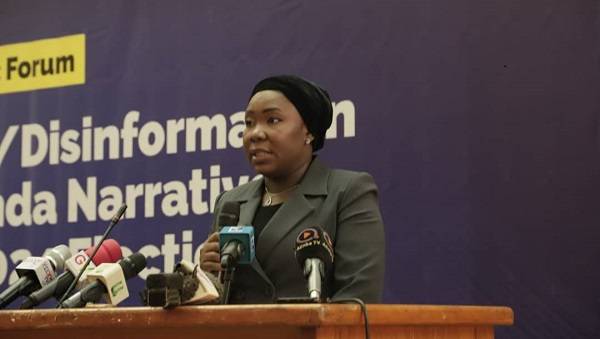The government has reaffirmed its commitment to safeguarding the integrity of electoral process against the effects of false information.
According to the Minister of Information-designate, Fatimatu Abubakar, the proliferation of false information, deliberate misinformation campaigns, and insidious propaganda narratives, in recent times, had posed a grave threat to the democratic principles upon which the nation was founded.
These acts, she said often propagated through various channels, including social media, traditional media, and word-of-mouth, which sought to undermine the trust and confidence of electorate and “sow seeds of discord among citizens.”
“As citizens and custodians of democracy, it is incumbent upon us to confront this challenge head-on. The integrity of our elections is not merely a matter of political expediency; it is a fundamental pillar upon which our democratic institutions rest. It is the bedrock upon which the voice of the people is heard and the will of the electorate expressed,” she added.
The minister was speaking at a public forum on countering mis/disinformation and propaganda narratives in Ghana’s 2024 election organised by Media Foundation for West Africa in collaboration with the National Peace Council (NPA) and National Commission on Civic Education (NCCE) in Accra Wednesday.
The forum, with funding support from the Foreign Commonwealth and Development Office aimed at building and strengthening the ecosystem for countering mis/disinformation.
It brought together governance experts, media experts, security analyst, legal experts, civil society organisations, public/state institutions, political parties, religious groups, journalists, the diplomatic community, and human rights activists.
The minister said in recognising the challenge, the government had embarked on proactive measures to combat misinformation and disinformation.
Some of the measures, she said included the launch of the GhanaToday website which served as a platform against misinformation, offering unfiltered information directly from government sources, implementation of media literacy programmes, the draft of a National Action Plan which outlined strategic objectives, including enhancing media literacy among citizens, strengthening fact-checking mechanisms, introducing a structured reporting system for false information, promoting ethical journalism, reviewing existing legislation, and collaborating with technology platforms.
Beyond that, the minister said the government had already established legal provisions under Section 76 of the Electronic Communications Act 2008 (Act 775) and Sections 185 and 208 of the Criminal Offenses Act 1960 (Act 29) to penalise individuals who intentionally spread false information.
These legal measures, she said underscored the gravity with which the government views the dissemination of misinformation, however, there were ongoing dialogue as to whether these laws should remain in the law books.
The minister called for a “shared responsibility” to ensure the integrity of the country’s electoral process, and uphold the principles of democracy.
The Chairperson of NCCE, Ms. Kathleen Addy, in a speech read on her behalf said mis/disinformation could undermined the integrity of elections, and affect voter turnout, thereby preventing citizens from making informed voting choices.
The Executive Director, MFWA, Sulemana Braimah, said Ghana was faced with the challenges of disinformation campaigns ahead of this year’s election and if the situation was not tackled robustly, the consequences could be dire.
The Board Chairman of NPC, Rev. Dr. Ernest Adu-Gyamfi, for his part, urged citizens to stand united in defending the principles of democracy, promoting transparency and acquiring the generics of accurate information to ensure peaceful and violent free election 2024.
BY VIVIAN ARTHUR
PX: Forum 1&2/samba/27/03/24
Caption: Fatimatu Abubakar (inset) addressing participants at the forum




















Discussion about this post